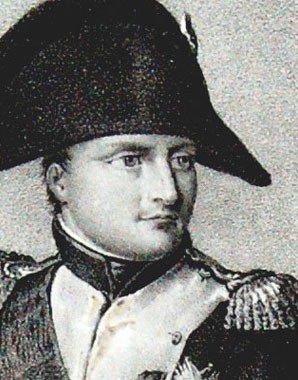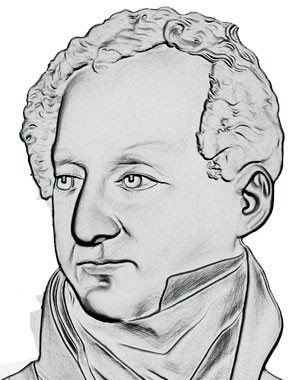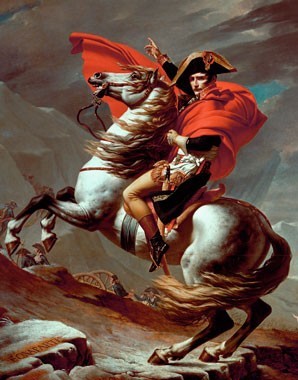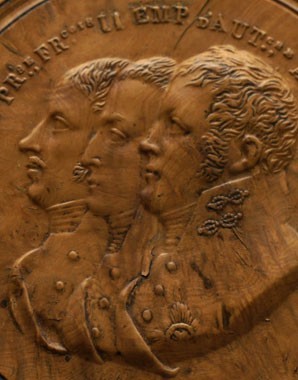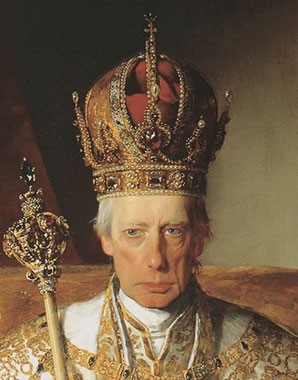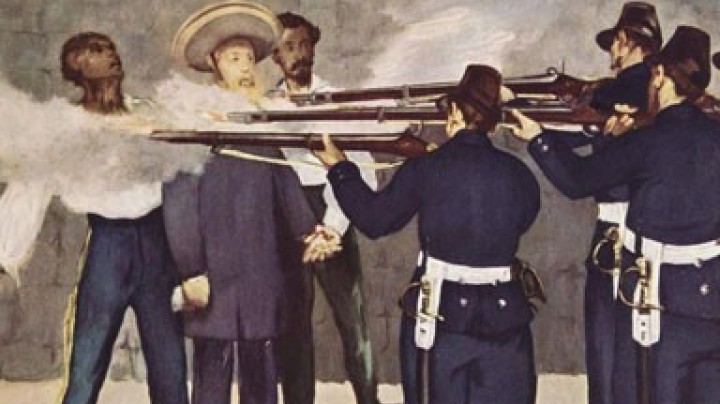Emperor Franz II/I and Napoleon
The reign of "the good Emperor Franz" was characterised by disputes with Napoleon, who subjected the venerable thrones of Europe to a thorough shake up.
When Emperor Leopold II died suddenly after ruling for only two years (1790-1792), he was followed on the throne by his 24-year-old son Franz II. It was no easy legacy that the new monarch inherited, as the defensive alliance concluded with Prussia by his father was being viewed by France with increasing suspicion. Immediately after Franz assumed the reins of government in March 1792, France issued an ultimatum demanding that Austria renounce its alliance with Prussia. Austria’s refusal to comply with the ultimatum prompted France to declare war. Three years later Prussia left the coalition, and a young Corsican officer saw his chance of deciding the war in France’s favour. Napoleon Bonaparte led France to victory, and under the terms of the ensuing Treaty of Campo Formio, Austria suffered large losses of territory. However, the peace was short-lived, hostilities resuming in 1799. Despite support from Russia, the second war of coalition ended once again in victory for Napoleon. Although the Treaty of Lunéville resulted in only insignificant losses for Emperor Franz II, it set off a momentous process. The treaties of Campo Formio and Lunéville included compensation for the German princes for losses of territory resulting from the cession of the left bank of the Rhine to France, thus severely weakening Austria’s influence in the Holy Roman Empire.
When Napoleon had himself proclaimed Emperor of the French in 1804, Franz II assumed the title of hereditary emperor of Austria as Franz I. His desire to restore the balance of power in Europe led not only to an alliance with Russia, Great Britain and Sweden, but also to the third war of coalition during the course of which French troops occupied Vienna. Russian and Austrian forces were defeated decisively at the Battle of the Three Emperors at Austerlitz, and in the subsequent Treaty of Pressburg Austria again suffered major losses of territory. In 1806 the withdrawal of 16 princes from the German Imperial Confederation led to the dissolution of the Holy Roman Empire. At the Diet in Erfurt in 1808, four kings and 34 princes of the Confederation of the Rhine paid homage to the French emperor as the de facto ruler of Europe. Emperor Franz I had refused to participate and suffered the indignity of receiving a letter from Napoleon containing the following claim: “ It was in my power to destroy the Austrian monarchy. What your Majesty is, is by virtue of our will.”
Emperor Franz was so incensed by this that he declared war on France in April 1809. Napoleon repeated his bold advance of 1805 and was soon at the gates of Vienna. Archduke Karl managed to defeat the Grande Armée at Aspern in the Marchfeld region near the capital, but the joy of this victory was short-lived, for Austrian forces were once again defeated in a second battle nearby at Deutsch Wagram, and Napoleon dictated the terms of the Treaty of Schönbrunn. Metternich, whose approach was characterised by a willingness to compromise, was appointed the new head of foreign policy and negotiated a marriage between Napoleon and Marie Louise, the daughter of the Austrian emperor. This familial tie involved Austria in Napoleon’s greatest venture, his campaign against Russia in 1812/13. Prussia and England allied themselves with Russia. After initial hesitation, Emperor Franz I then also declared war on France. In the Battle of Nations at Leipzig Napoleon’s forces suffered an annihilating defeat. With the Allies advancing on Paris, Napoleon fled to the island of Elba. In autumn 1814 negotiations began at the Congress of Vienna. Napoleon’s return to Paris accelerated the negotiations and the final treaty was signed on 9 June 1815. Following his defeat at Waterloo Napoleon was exiled to the bleak island of St. Helena in the southern Atlantic where he died on 5 May 1821.



